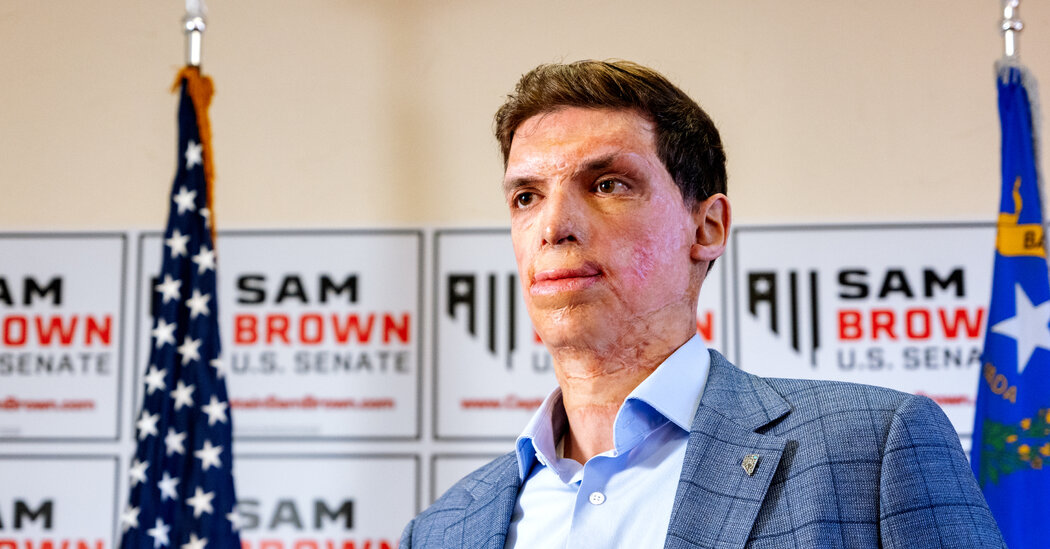Sam Brown, an Army veteran who was the heavy favorite in the Nevada Republican primary race for Senate even before former President Donald J. Trump’s last-minute endorsement, won the nomination on Tuesday, according to The Associated Press.
He will face Senator Jacky Rosen, the state’s Democratic incumbent, in one of the most closely watched Senate contests of the year.
With 68 percent of the vote counted, Mr. Brown had 57 percent, lapping the crowded primary field. His closest rival, Jeff Gunter, a former U.S. ambassador to Iceland, had about 16 percent. Jim Marchant, a former state assemblyman, was at roughly 7 percent, and Walter Grady, an Air Force veteran who goes by Tony, had 6 percent.
In his victory speech, delivered to ebullient supporters in a Reno hotel, Mr. Brown said he was focused on holding Ms. Rosen and President Biden accountable for their policies, and giving a beleaguered electorate something to hope for.
“It is tonight that we continue to deliver hope that the American dream is not dead,” Mr. Brown said. “And the American nightmare under Joe Biden and Jacky Rosen begins to end tonight.”
The victory was a redemption of sorts for Mr. Brown, who ran for Senate in 2022 after moving to Reno, Nev., from Dallas in 2018, but lost in the Republican primary to Adam Laxalt, the state’s former attorney general. This time, he was the pick of the Republican establishment from the start, and the National Republican Senatorial Committee, which works to elect Republicans to the Senate, backed him early and worked to clear the field of competitors.
They did not quite manage that. Roughly a dozen Republican challengers vied for the right to face Ms. Rosen, a low-profile Democrat running for re-election in a battleground state where recent elections have been decided by narrow margins.
But most gained little traction, and as Mr. Brown crisscrossed the country raising money and rallying support from prominent Republicans, the other candidates failed to come close to his fund-raising totals. He also earned the endorsement of the state’s Republican governor, Joe Lombardo.
Mr. Brown ran as though he was already in the general election, skipping debates with his Republican opponents, avoiding tying himself too closely to the hard-line conservative wing of the party, and keeping his focus trained on Ms. Rosen, who clinched the Democratic nomination on Tuesday.
Ms. Rosen took aim at Mr. Brown after his victory Tuesday evening, and the Democratic Senatorial Campaign Committee, which works to elect Democrats to the Senate, was quick to publish a digital advertisement bashing him.
“My opponent is a MAGA extremist who will say anything to get elected,” she said in a statement, rattling off a list of issues, like abortion, that she plans to attack him on. “Voters will have a clear choice in this race between a senator who always puts Nevadans first and a politician who only moved here a few years ago just to run for office.”
In the primary, Mr. Brown was slow to back Mr. Trump’s latest bid for the White House, a hesitation that did not go unnoticed among some Republicans, and Mr. Trump waited until the race’s final days to endorse him.
Rivals sensed an opening from the right, and in April, Mr. Gunter tried to shake up the race, announcing a multimillion-dollar advertising effort playing up his MAGA credentials while slamming Mr. Brown as insufficiently loyal to Mr. Trump. The attacks forced Mr. Brown and his allies to engage in the primary race for the first time, but it ultimately did little to alter the trajectory of the campaign.
Mr. Brown’s unique background could draw in voters. In 2008, he was nearly killed while serving in Afghanistan when his vehicle drove over a roadside bomb. He underwent more than 30 surgeries during a three-year recovery, and was left permanently scarred.
In his pitch to voters, Mr. Brown often refers to his near-death experience. In his speech on Tuesday, he said he was speaking to Americans who “are at a point like I was on that day in 2008, where we are this close to allowing hope to be extinguished.”
And what is perhaps the informal slogan for his campaign — which he urged the audience to shout out on Tuesday — is the same phrase an Army comrade told him when he helped to extinguish the flames that were burning Mr. Brown in Afghanistan: “I’ve got you.”
“Sam is an American hero who is once again answering the call to serve our country,” Senator Steve Daines of Montana, who leads efforts to get Republicans elected to the Senate, said in a statement after Mr. Brown’s win.
Mr. Brown’s campaign will emphasize popular Republican talking points — border security and inflation — and lay the blame for the Nevada economy’s sluggish recovery from the pandemic at the feet of President Biden and Ms. Rosen.
Ms. Rosen’s campaign plans to emphasize her bipartisan reputation and highlight times when she has defied Mr. Biden, who is unpopular in the state. She will point to victories on issues like lowering prescription drug prices while attacking Mr. Brown’s record on abortion rights.
In the past, Mr. Brown expressed support for a 20-week ban with no exceptions for rape or incest. After announcing his campaign for Senate, he clarified that he would not support a nationwide ban, and told The New York Times that the issue should be left to the states.
#Sam #Brown #Wins #Nevada #G.O.P #Senate #Primary #Face #Jacky #Rosen #November,
#Sam #Brown #Wins #Nevada #G.O.P #Senate #Primary #Face #Jacky #Rosen #November
